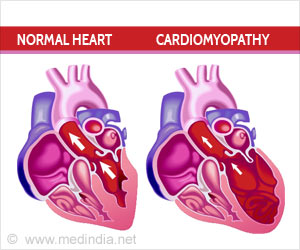Highlights:
- New drug target identified to treat patients with familial dilated cardiomyopathy (DCM).
- DCM is a life-threatening heart condition, known to be associated with a specific genetic mutation
- Certain forms of dilated cardiomyopathy run in families and have been shown to be associated with a genetic mutation causing improper function of the heart, sometimes resulting in cardiac arrest and sudden death
- The genetic mutation abnormally activates the platelet-derived growth factor, or PDGF, pathway, which can be potentially inhibited by drugs and could be used to treat dilated cardiomyopathy in the future
Read More..
Studying Activity of Lab-grown Heart Muscle Cells of Dilated Cardiomyopathy Patients
- The team looked at heart muscle cells of patients having familial dilated cardiomyopathy, which is linked to a specific mutation termed the lamin mutation
- To obtain heart muscle from these patients, the research team generated pluripotent stem cells in the lab from the patient’s own skin cells.
- These pluripotent cells can then be made to differentiate into any specialized tissue of the human body including heart muscle cells
- Similarly, pluripotent stem cells can also be made from a small quantity (about 10 ml) of patient’s blood
- Heart muscle cells from normal patients grown in the lab show rhythmic beating similar to normal heartbeat, but heart cells from patients with familial dilated cardiomyopathy linked to the lamin mutation beat irregularly and show abnormal electrical activity
- The defect could be rectified by introducing a copy of the normal gene using gene-editing technology, and making the heart muscle cells beat normally
- In the same way, introducing the lamin mutation into healthy heart cells caused them to beat irregularly
- Cells with the lamin mutation demonstrated calcium levels, a key ion that modulates heart muscle contraction
Thus, the research team confirmed that heart muscle cells in patients with lamin mutation and dilated cardiomyopathy had irregular rhythm and did not contract normally.
Testing Effects of Specific Drugs on Irregular Heart Rhythm
- The study team found that the lamin mutation abnormally activated several genes associated with the platelet-derived growth factor (PDGF) pathway
- The PDGF pathway is critical in forming blood vessels and is normally only activated when the heart muscle is under stress
- To clarify whether the abnormal PDGF pathway caused the irregular rhythm or was the result of the abnormal rhythm, the team treated heart cells in patients with lamin mutation with two drugs namely crenolanib and sunitinib that block the PDGF receptor
- After the addition of these drugs, the heart cells began to beat rhythmically, and their gene activation resembled that of heart cells from healthy persons
The two drugs are FDA-approved to treat several cancers. However, earlier studies by the team have shown that the drugs can injure the heart at high doses, and thus, need to be further evaluated to identify the correct dose or find suitable alternatives.
Using Cells Derived From Patient’s Stem Cells To Test New Drugs
The current research is part of the greater efforts of the study team in obtaining specialized cells such as heart or brain cells from patient stem cells to study disease effects and response to newer drugs."With 10 ml of blood, we can make clinically usable amounts of your beating heart cells in a dish," said the study's senior author, Joseph Wu, MD, PhD, director of the Stanford Cardiovascular Institute and a pioneer of the technique. "And if you tell me you're taking some kind of medication for your heart -- like beta-blockers or statins -- we can add that to see how it affects your heart. That's the beauty of this approach."
Dr. Wu further states that he has asked research scholars in his lab to use his blood to generate his heart cells, liver and brain cells to test the efficacy of drugs he may need to take in the future.
About Dilated Cardiomyopathy
- In dilated cardiomyopathy, the left ventricle, which is the main pumping chamber of the heart expands to such an extent that the heart is unable to contract properly
- Patients with dilated cardiomyopathy suffer from breathlessness, chest pain and sometimes may result in sudden and deadly cardiac arrest
- Approximately 1 in every 250 Americans is diagnosed with a type of dilated cardiomyopathy of unknown etiology and up to 35% of these cases run in families
- Current treatments aim to alleviate symptoms and improve quality of life
Reference:
- Researchers Identify Possible Drug Target for Deadly Heart Condition - (http://med.stanford.edu/news/all-news/2019/07/researchers-identify-possible-drug-target-for-heart-condition.html)














